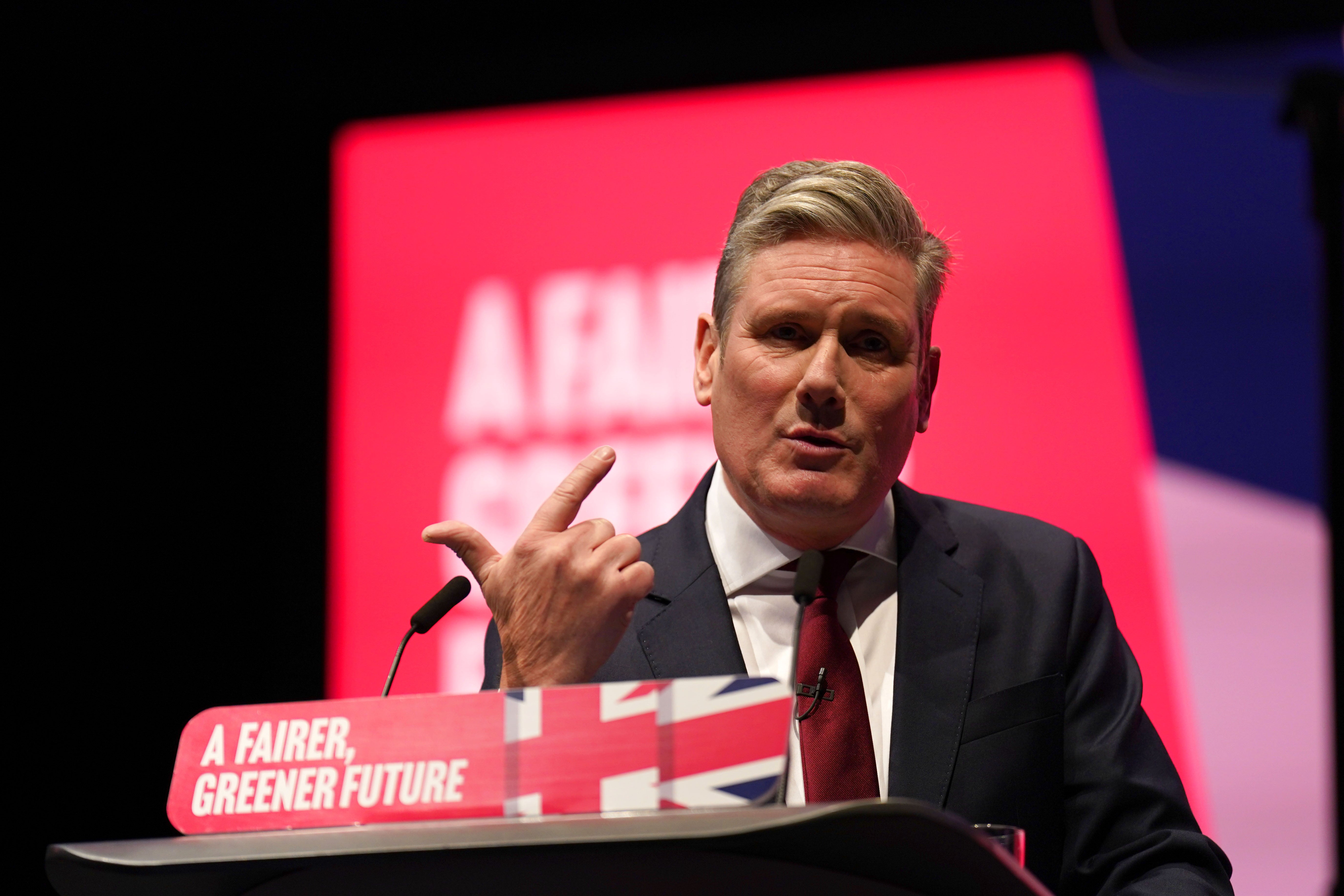All Keir Starmer had to do was to sound reasonably coherent – and he succeeded
John Rentoul on a decent enough speech that remained securely in the Labour Party’s comfort zone


It wasn’t a great speech, but it didn’t have to be. Keir Starmer is not a great speaker, but he doesn’t have to be. He had to read out a reasonably coherent text, remind people that he once had a real job, and look like a plausible prime minister. He succeeded triumphantly on all points.
He faced a huge political opportunity, handed to him on a plate by an incompetent, overconfident government, and he didn’t make a fool of himself. Given the eagerness with which Liz Truss and Kwasi Kwarteng seem determined to help him, that was all he needed to do.
Parts of the speech were well designed to win over some of the voters Labour lost at the last election. The section on Brexit was surprisingly honest. “It’s no secret I voted Remain,” Starmer said, mentioning something he has tried hard not to mention for the past few years, before adding: “as the prime minister did”.
Truss’s Remain vote ought to have undermined her standing with the Tory faithful more than it did, because it makes her connection with Leave voters weaker than Boris Johnson’s ever was or Rishi Sunak’s could have been. It opens up that group of swing voters to a rival offer from Starmer. “I want to speak directly to the people who left Labour on this issue. Whether you voted Leave or Remain, you’ve been let down,” he said. “If you voted to take control of your life and for the next generation to have control of theirs, then I say to you: that is what I will deliver.” It is a measure of the changing terms of political trade that “Take Back Control” could work better for Labour at the next election than for the Conservatives.
Apart from that section, however, there was little attempt to reach out to former Tory voters. Starmer was in the comfortable position of having the Tory prime minister and chancellor do his work for him in driving their voters away. So many of them are deeply offended by tax cuts for the rich at a time of national hardship that all Labour has to do is look respectable and not incompetent to reap the benefit.
Starmer had a few Blairite phrases – he even claimed that Labour was “the party of the centre ground” – and he continued to distance himself from the legacy of Jeremy Corbyn. There was a pointed reference to Vladimir Putin’s “imperialism” which isn’t the kind of language Starmer’s predecessor would use, and a pro-business rhetorical tilt through the whole speech.
But it was not a Blairite speech, in that it remained securely in the Labour Party’s comfort zone – albeit with an ambiguous green tinge. It contained a flash of partisan hostility when Starmer told delegates not to forget or “forgive” the tax cuts for the richest 1 per cent. And large expanses of it consisted of platitudes and lists of places in Britain.
The delegates willed it on, interrupting with a dozen standing ovations. They can sense that the political playing field has tilted sharply in their favour and happily cheered any reference to the “next Labour government” knowing that it means something now.
They don’t yet believe the opinion polls, because a Labour majority would require an unprecedented swing, but the disarray in the government is so chaotic and so unexpected that the prospect of a minority Labour government in a hung parliament now seems well within their grasp.
Hence some of the interesting things that Starmer didn’t say in his speech. His attack on the Scottish National Party said nothing about why it was relevant – it didn’t need to because everyone in the hall understood the context. In an election campaign in which a hung parliament is a likely outcome, the Tory attack on a Labour-SNP “coalition of chaos”, which was so successful in 2015, would still be a powerful one. Hence: “We can’t work with them. We won’t work with them. No deal under any circumstances.”
There wouldn’t have to be a deal, because the SNP would have to allow a minority Labour government to rule, because it couldn’t prop up a Conservative government – but the important message is to try to stifle the “coalition of chaos” before the Tories deploy it.
The other silence in the speech was the Liberal Democrats, not mentioned once. The Lib Dems are in a similar position to the SNP, in that they can hardly put a Tory prime minister in No 10 after the next election either. But there could be something in it for both parties if they cooperate informally before and after an election.
If Starmer is serious about preparing for government, good relations with the Lib Dems are a simple precaution. This was the speech of a leader who is serious about preparing for government.






Join our commenting forum
Join thought-provoking conversations, follow other Independent readers and see their replies
Comments